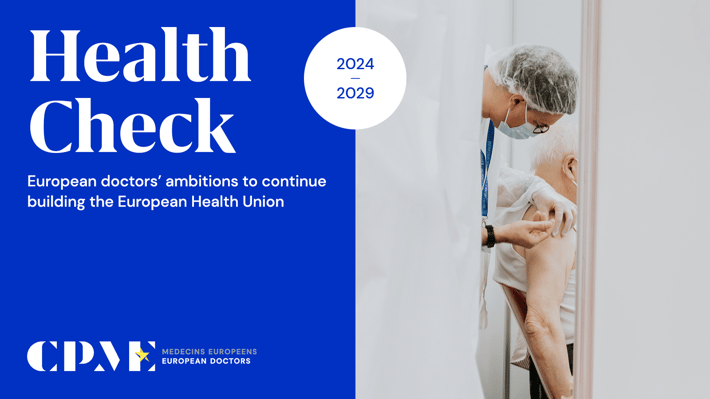Health Check for Europe 2024-2029

In recent years, European countries have made huge advances in collaboration on health. We cannot take a step backwards.
The COVID-19 pandemic has shown that health is the foundation of our economy and society, exposing long-standing problems in our health systems and workforce. These problems have not been solved. At the same time, the pandemic showed the value of European cooperation and solidarity.
The European Health Union is not complete: the EU needs a coherent long-term vision for health in Europe and beyond for equitable access to healthcare for patients.
European doctors remain strongly committed partners in making these ambitions a reality.
We urge European policy-makers to:
We need action on retention and recruitment. Doctors must have lawful working conditions and safe staffing levels.
The pandemic has exacerbated existing problems, such as workforce shortages, and raised new challenges, such as how to build surge capacities. Excessive workload, violence and verbal abuse towards healthcare professionals is rising with devastating consequences for mental and physical health. Medicine is losing its attractiveness as a life-long profession, and if we continue in this path we will not have a functioning health workforce.
Workforce shortages cannot be solved by lowering training requirements or causing brain drain in other countries by contravening WHO’s ethical recruitment policies. Collaboration between the educational field, universities, employers and ministries is necessary to reduce rising deficits by making the medical profession more attractive. We need to invest more to ensure a sufficient health workforce who can enjoy high quality training and practice conditions to provide the best possible patient care.
The EU, and all public and private stakeholders across Europe, must respect ethical principles of medical confidentiality and professional secrecy of health data.
EU health data exchange frameworks, including IT infrastructures, must be trustworthy and robust, otherwise patients may become reluctant to provide information or even to consult with their doctor with confidence if they fear that their data will not remain secret.
We need to optimise functionality of digital health tools as doctors’ time should be spent on patient care and should not be diverted by excessive administration. The digital health transformation cannot advance without doctors being fully supported with resources for digitisation and tools for digital literacy.
The EU must implement a ‘Health in all policies’ approach and make better use of its cross-sectoral regulatory tools to prevent disease and improve people’s physical and mental health and well-being.
A lack of action on preventable diseases causes avoidable mortality, morbidity, and financial costs. Evidence shows that marketing restrictions, taxation and labelling of alcohol, tobacco and nicotine products are effective. This also applies to regulating food and drinks that are high in fat, sugar and salt. The EU can also do more to create sustainable food systems, promote healthier diets, and improve environments for active mobility. Further action is needed towards people who live with financial hardship or poverty which exacerbates chronic diseases such as diabetes and cardiovascular diseases.
Member States must be supported to implement infection prevention, increase vaccination coverage and confidence, improve health literacy and tackle disinformation.
The EU’s pharmaceutical framework must ensure access to affordable and safe medicines for all patients in Europe, and rebalance incentives in the sector to serve medical and societal needs.
The deepening medicine shortages have a negative impact on patient safety and the work of doctors. The EU must be equipped with resilient secure supply chains to ensure availability of essential medicines. Healthcare professionals require an effective monitoring and alert system to react to shortages in a timely manner.
Antimicrobial resistance requires urgent and decisive EU action to ensure availability of effective antimicrobial treatments for patients in need, while considerably reducing unnecessary consumption in healthcare and animal husbandry.
The EU must meet its target to be climate-neutral by 2050, including the 2030 intermediate target to reduce net greenhouse gas emissions by at least 55% compared to 1990 levels.
Heatwaves, pollution, floods, drought, as well as shifting the geographical distribution and emergence of new diseases, are major climate related health threats in Europe. National and local health systems need to take action through changes in education and capacity, in line with the One Health approach.
European doctors are willing to help find solutions to improve the environmental footprint of the healthcare sector, without compromising patient safety and care, for example by improving energy efficiency, reducing waste and greenhouse gas emissions, introducing more sustainable procurement, and promoting disease prevention as the most sustainable healthcare is the reduced need for healthcare.